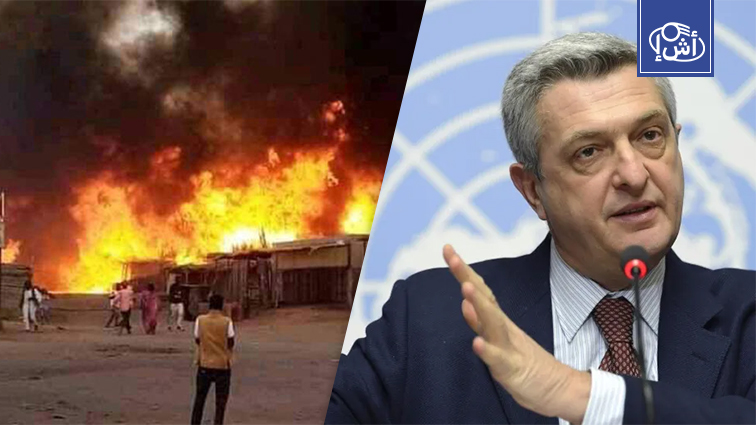The United Nations High Commissioner for Refugees, Filippo Grandi, said on Thursday that the reports coming from the city of El Fasher, the capital of North Darfur state in western Sudan, are “horrific.”
Grandi wrote on his account on the X platform, commenting on the killing of civilians due to renewed clashes in El Fasher between the Sudanese army and the Rapid Support Forces: “Deadly attacks on civilians in El Fasher, with terrifying accounts of them being targeted, and people are so scared of checkpoints that they don’t even dare to flee.”
He demanded that “the violence against civilians must stop, their right to safety must be respected, and a ceasefire is needed now. The reports coming from there are horrific.”
On Wednesday, civilians were killed, and others were injured as a result of violent clashes in El Fasher between the army and the Rapid Support, during which heavy weapons were used, according to eyewitnesses.
For weeks, the Rapid Support Forces have besieged the city of El Fasher, the center of North Darfur state, and the historical capital of the Darfur region, and are seeking to control it. It is the last stronghold of the army in the region, after the fall of all cities and military areas at the hands of the “Rapid Support” since last year.
In its current battle in El Fasher, the army is supporting the most prominent armed movements that have signed a peace agreement with the government since 2020, including the “Justice and Equality Movement” led by Jibril Ibrahim, Minister of Finance, and the “Sudan Liberation Movement” led by Minni Arko Minawi, the governor of the Darfur region.
El Fasher is the center of the Darfur region, which consists of 5 states, its largest city, and the only one among the capitals of the other states of the region that did not fall to the Rapid Support Forces in their armed conflict against the army, despite international warnings about the battles in El Fasher, which is the center of humanitarian operations for all Darfur states. .
As the intensity of the fighting escalates, continuous waves of displacement of citizens are recorded fleeing the battles, especially the battles of El Fasher, amid successive warnings issued by the United Nations that the opportunity to avoid famine in conflict areas is rapidly narrowing, with the start of the rainy season next June, which will make access to roads more difficult. Biotransportation is not possible.
Last Friday, United Nations Commissioner for Human Rights Volker Türk said in a statement published by his office: “We are horrified by the escalation of violence in the El Fasher battles and its devastating impact on civilians.”
The spokeswoman for the High Commissioner for Human Rights, Ravina Shamdasani, said in a statement on May 17 that Türk urged the Sudanese army commander, Abdel Fattah al-Burhan, and the commander of the Rapid Support Forces, Mohamed Hamdan Dagalo (Hemedti), to act immediately and publicly to calm the situation, adding that he “warned the two commanders against “The battles for El Fasher, where there are currently more than 1.8 million residents and internally displaced persons trapped and at imminent risk of famine, will have a catastrophic impact on civilians and will lead to a deepening of the sectarian conflict with catastrophic humanitarian consequences.”
The military conflict between the Sudanese army and the Rapid Support Forces has continued month after year, since its outbreak on April 15, 2023, with the El Fasher battles currently at the forefront of the scene, at a time when the international mediation parties, led by the United States and Saudi Arabia, are working to push the two parties to go to the city of Jeddah to resume… Talks between them for a ceasefire, and an agreement to open safe paths to deliver humanitarian aid to those in need.
The American envoy to Sudan, Tom Perillo, explained in a meeting with Sudanese civil society organizations and journalists on May 14 in Kampala, the capital of Uganda, that “all parties received an invitation from Saudi Arabia, and they are working daily to ensure that they accept the invitation and attend.”
He added, “Part of the discussions with the parties currently is to ensure, not only that they appear in Jeddah for the talks, but that they are prepared to sign an agreement that will restore peace in Sudan.”
He continued: “We do not believe that the war is going to be won by any party, but rather it is likely to become more complicated, and it is likely to lead to interventions by neighboring countries and become more difficult.”
Libya… Khoury meets Field Marshal Haftar to discuss the election file in the country
